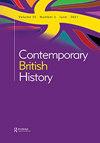‘I am almost the middle-class white man, aren’t I?’: elite women, education and occupational trajectories in late twentieth-century Britain
IF 0.6
2区 历史学
Q1 HISTORY
引用次数: 0
Abstract
This paper makes a major intervention in the historiography of elites through analysis of the experience of women occupational elites born in post-war Britain. The paper draws on a new set of oral history interviews recently conducted with women born in the post-war decades with an entry in Who’s Who which is the leading biographical dictionary of ‘noteworthy and influential’ people in the UK. The women we interviewed were all highly occupationally successful and those analysed here also attended one of twelve elite girls’ schools. This article argues that our interviewees can be separated into two distinct post-war cohorts: one born between early 1940s and mid-1950s and the other born late 1950s to late 1960s. The shape and structure of the cohort’s trajectories were different, their relationship to their careers were different, and, even though both groups faced sexual discrimination and unequal divisions of labour, the nature of these gendered inequalities changed too. By foregrounding elite women within this shifting historical context, this article illuminates broader trends in both classed and gendered experience and how this related to the changing nature of the economy in recent history.“我几乎是一个中产阶级白人,不是吗?”: 20世纪末英国的精英女性、教育和职业轨迹
本文通过对战后英国女性职业精英经历的分析,对精英史学进行了一次重大的介入。这篇论文借鉴了一组新的口述历史访谈,这些访谈是最近对战后几十年出生的女性进行的,这些访谈被收录在英国“值得注意和有影响力的”人物传记词典《Who’s Who》中。我们采访的女性都是职业上非常成功的人,这些被分析的女性也就读于12所精英女子学校中的一所。本文认为,我们的受访者可以被分为两个截然不同的战后群体:一个出生于20世纪40年代初至50年代中期,另一个出生于50年代末至60年代末。这群人的轨迹的形状和结构是不同的,他们与职业的关系是不同的,而且,尽管这两个群体都面临着性别歧视和不平等的劳动分工,这些性别不平等的本质也发生了变化。通过在这种变化的历史背景下突出精英女性,本文阐明了阶级和性别经验的更广泛趋势,以及这与近代史上不断变化的经济性质之间的关系。
本文章由计算机程序翻译,如有差异,请以英文原文为准。
求助全文
约1分钟内获得全文
求助全文
来源期刊

Contemporary British History
HISTORY-
CiteScore
1.40
自引率
14.30%
发文量
34
期刊介绍:
Contemporary British History offers innovative new research on any aspect of British history - foreign, Commonwealth, political, social, cultural or economic - dealing with the period since the First World War. The editors welcome work which involves cross-disciplinary insights, as the journal seeks to reflect the work of all those interested in the recent past in Britain, whatever their subject specialism. Work which places contemporary Britain within a comparative (whether historical or international) context is also encouraged. In addition to articles, the journal regularly features interviews and profiles, archive reports, and a substantial review section.
 求助内容:
求助内容: 应助结果提醒方式:
应助结果提醒方式:


